#Lionel Mandrake
Text

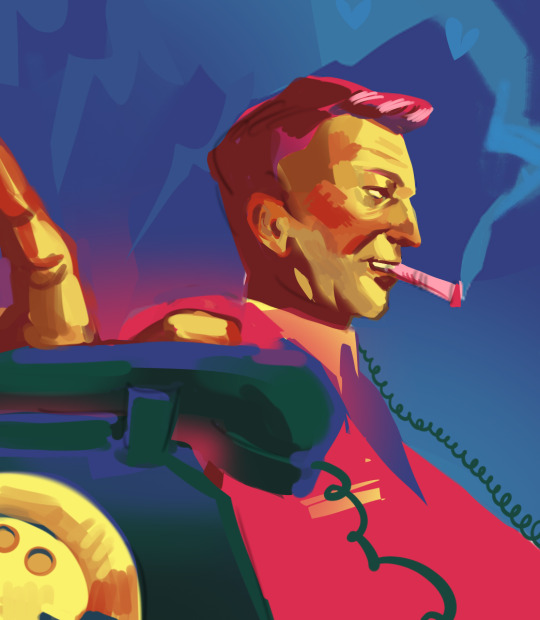
mutually assured destruction
#dr strangelove#strangelove#Dr. Strangelove or: How I Learned to Stop Worrying and Love the Bomb#my art#Jack D. Ripper#Lionel Mandrake#what even is their ship name#do they even have one#rip drake
202 notes
·
View notes
Text
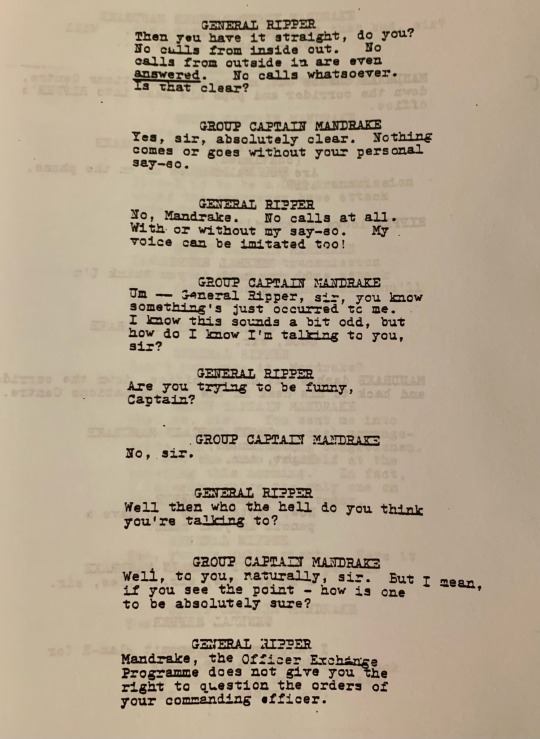
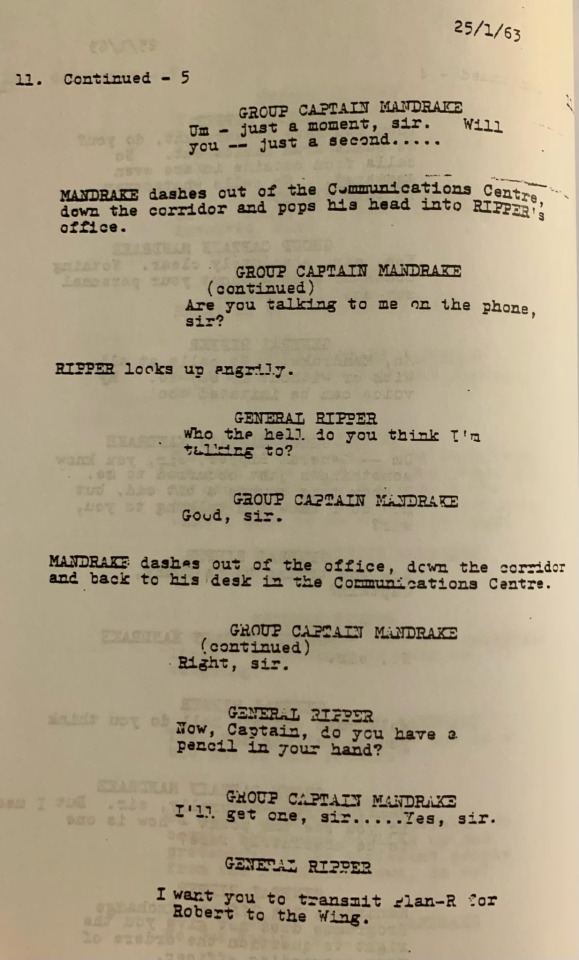
#why didn’t they keep this… frown#dr strangelove or: how i learned to stop worrying and love the bomb#lionel mandrake
6 notes
·
View notes
Text
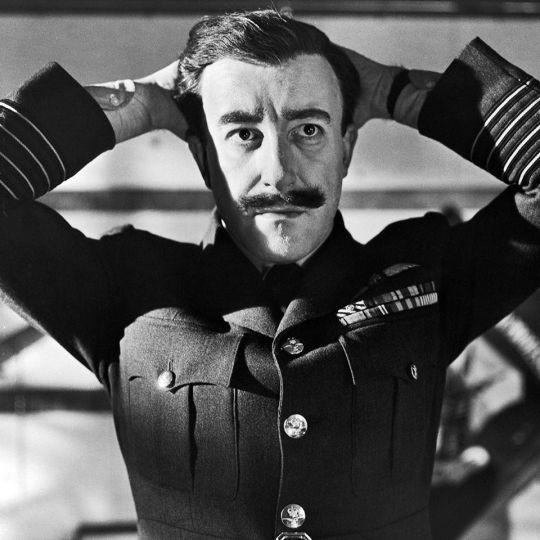

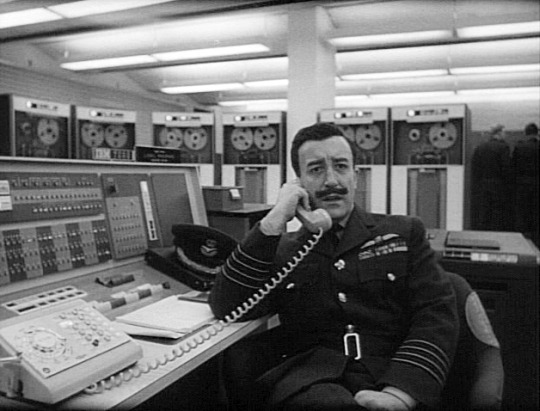




#captain mandrake#group captain lionel mandrake#dr. strangelove#dr. strangelove: or how i learned to stop worrying and love the bomb#peter sellers#anon#mod: eddie
49 notes
·
View notes
Text
Dr. Strangelove or: How I Learned to Stop Worrying and Love the Bomb (1964)
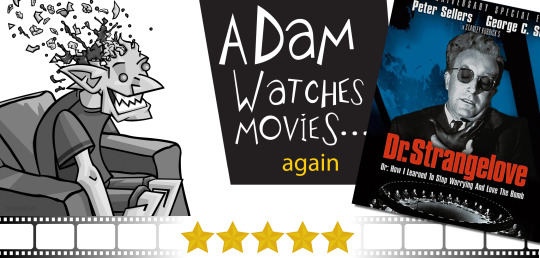
Dr. Strangelove or: How I Learned to Stop Worrying and Love the Bomb, is a film so permanent you don’t even know how much influence it's had until you've seen it. This satirical take on the Cold War is both hilarious and terrifying thanks to an impeccable attention to detail, terrific performances, and more than one scene that will stick with you forever.
United States Air Force Brigadier General Jack D. Ripper (Sterling Hayden) has done the unthinkable and single-handedly declared nuclear war against the USSR. With foolproof safety precautions preventing further orders from reaching the planes approaching enemy territory, his executive officer Group Captain Lionel Mandrake (Peter Sellers) desperately searches for a way to recall the attack. Meanwhile, the President of the United States (played by Sellers again) attempts to prevent the incoming catastrophe with the help of his advisors and the mysterious Dr. Strangelove (Sellers one more time).
The film begins with an assurance that what takes place here could never happen in real life. This statement is about as convincing and reassuring as a friendly dinner invitation from Hannibal Lecter. No detail is spared when showing us the codes, secret envelopes, radio signals, and equipment that form this air-tight mechanism designed to prevent wrong orders from reaching the planes. These planes - always in the air and always ready to strike - ensure that if the Soviet Union decides to strike "the free world" retaliation will be swift. But what happens when a jingoistic lunatic decides that counterattacking isn’t good enough? It could mean a long-lasting nuclear winter that’ll wipe out all humanity. If not, it could be the much-needed catalyst to usher us into an era of global peace. That’s, of course, if General Ripper can be prevented from damning us all.
So thorough is this exploration of mutually-assured nuclear destruction that only repeat viewings will allow you to appreciate the humorous side of this scenario. Like so many boneheaded attempts by the Soviet Union and the U.S.A. to one-up each other during the Cold War, Dr. Strangelove is funny in hindsight but in the moment it makes you sweat buckets. The suspense is intensified by how many people fail to realize how close they are to complete annihilation. That, in turn, is what makes it so funny. Seeing Captain Mandrake sit back and try to remain calm while he’s listening to General Ripper’s rambling logic, General Buck Turgidson (George C. Scott) trying and spin the scenario into something positive for the President, witnessing the clearly insane Dr. Strangelove (who isn’t actually in the film all that much) propose a solution in case war does break out makes you want to jump into a straightjacket… until you realize your side of the screen is perfectly safe.
There are so many memorable elements in this film. Dr. Strangelove and his Alien Hand Syndrome (a syndrome often called Dr. Strangelove Syndrome), Ripper yammering about “precious bodily fluids” or the U.S. President’s interactions with the Russian President, the introduction credits, the music, the design of the Pentagon’s War Room, the screenplay, the cinematography (gorgeous and chilling black-and-white) and the performances. Every aspect of filmmaking is firing on all cylinders. It’s a movie you want to come back to again and again to catch all of the little details. There’s no way you can get everything Dr. Strangelove has to offer on a single viewing because unless you know ahead of time, there’s no way you’d recognize Sellers in his three roles. And that ending! This is a must-see. (On Blu-ray, October 20, 2017)

#Dr. Strangelove#movies#films#movie reviews#film reviews#Stanley Kubrick#Terry Southern#Peter George#Peter Sellers#George C. Scott#Sterling Hayden#Keenan Wynn#Slim Pickens#Tracy Reed#1964 movies#1964 films
9 notes
·
View notes
Text
(As suspected, my “Dr. Strangelove” review got looooong 😂 It’ll be under the cut for those interested!)
Well despite it being delayed somewhat it’s time once again for my weekly movie review! Where I talk about the movie I watched this week in film class at college. This week is one I’ve wanted to see since I decided I wanted to go into film: “Dr. Strangelove, Or How I Learned to Stop Worrying and Love the Bomb”, by Stanley Kubrick. I wanted to watch any Kubrick film, really, but considering this was his one and only comedy that had a lot of interesting elements (like the same guy playing three very different people) I was the most curious to check this one out!
Dear lord, do I wish I checked it out sooner. This movie is going up there with “Everything Everywhere All at Once” and “Horse Feathers” as one of my favorite movies ever so far. I guess you can tell I have a thing for absurdist comedies lol. Anyway, the plot!
The plot is set during the Cold War, and is kickstarted when a certain General Jack the Ripper (sorry, Jack D. Ripper) orders a nuclear attack on Russia, with no reason why except for a crazy conspiracy of his about “fluids” and the fact that he used the one attack plan that would allow him to get away with it. From there, we jump between three places: Ripper’s base, one of the planes, flown by Major Kong (played by a cowboy character actor), and the Pentagon’s War Room as tensions flair in each spot. Things turn dire once it turns out Russia has a “doomsday device” that will kill everything if they are attacked, and from there the race is on to recall the bombers. But fate continually has other plans, and officials continually are utterly crazy.
Would you believe this is a satire you’re supposed to laugh at? Well you better, cause this movie was very funny indeed! True, it take 20 minutes of its 90 minute runtime to get going, but once it does it doesn’t let go til the strains of “We’ll Meet Again” by Vera Lynn. Let’s start with the names as to why. General Jack D Ripper. General Buck Turgidson. President Merkin (…yes really) Muffley. Premier Dimitri Kissoff. And of course Dr. Strangelove himself. These are just some of the names that are treated with complete normalcy in this movie. And they aren’t the funniest thing by a long shot.
The acting is superb. All three of Peter Sellers’ characters, though very different, all get moments to shine (Strangelove, the ending scene, Muffley, the phone call to Russia, Lionel Mandrake, the gambit to call the president about the plane recall code). George C Scott as Turgidson was trolled by Kubrick into giving the scenery chewing performance he does but by god is the movie better for it. And Sterling Hayden as Ripper is deadly serious and sane-seeming at all times, perfectly at odds with his bizarre logic. Even Slim Pickens as Kong gets a few moments, especially the famous scene where he rides a bomb to the ground like a cowboy on a horse at a rodeo.
The look of the movie was really good, too, particularly the giant War Room (I honestly wish it was real, like as a museum exhibit or something). The script, of course, is awesome as well, with amazing line after amazing line (“Gentlemen, you can’t fight here! This is the War Room!”). But above all the thing that’s most amazing is how dry and audacious this movie’s sense of humor is. From Strangelove’s tongue slipping as he calls the President “Mein Fuher” to Muffley’s “if this wasn’t a friendly call you probably wouldn’t have even got it”, I can’t really imagine any comedy or satire today saying or doing half of this stuff. Imagine the reaction it got when it first came out and all of this was still going on! You could argue it still is, but I digress.
If I were to compare this movie to stuff that’s more modern my top two contenders would be “Airplane” and “Don’t Look Up”, but even then it’s not a straight one-to-one comparison. Both this movie and “Airplane” have actors acting dead serious while they say and do funny stuff, sure, but even in its most hilarious moments it’s not balls-to-the-wall like “Airplane”. “Don’t Look Up”, meanwhile, treats its doomsday ending very seriously (like it even gave me pause for a few minutes). While this one doesn’t even give it thought. “Oh, the world just ended? Here’s a cheerful song!”
What I mean by that is that I don’t think there’s really anything else completely like this movie out there, and it’s all the better for it. If you don’t mind military-precision humor that expects you to laugh at the more-than-ever very real possibility of the world ending, I highly recommend this movie! I would absolutely watch it again. If “learning to love the bomb” is a metaphor for learning to laugh at mistakes and the absurdity of life I think this movie is helping me get there lol
Anyway, enough rambling! Cause I could definitely ramble more about this one. Next week is another Kubrick movie! “2001: A Space Odyssey”. I’ve heard mixed things about it but I’m going to go in with an open mind and see what I think! My review of that will probably be the next time you hear from me, as like I said I’m not coming back just yet in order to focus on midterms. But I will be back soon!
Thank you for sticking to the end and reading all of this lol. We’ll meet again some sunny day soon, as the song so nearly went, and I’ll talk to you all then!

George C Scott was so good 😆 Shame he had to be duped to give this amazing performance but still!
#(the highlight was definitely the President and premier squabbling like a couple over the hotline 😂)#(I look to my left and right in the classroom and both people next to me have the widest grins! and so did I 😁)#(gotta reference it at some point…somewhere. lol)#STRING PULLER-out of character
2 notes
·
View notes
Photo

Jean Arthur and Gary Cooper in Mr. Deeds Goes to Town (Frank Capra, 1936)
Cast: Gary Cooper, Jean Arthur, George Bancroft, Lionel Stander, Douglass Dumbrille, Raymond Walburn, H.B. Warner, Ruth Donnelly, Gustav von Seyffertitz, Walter Catlett, John Wray, Emma Dunn. Screenplay: Robert Riskin, based on a story by Clarence Budington Kelland. Cinematography: Joseph Walker. Art direction: Stephen Goosson. Film editing: Gene Havlick. Music: Howard Jackson
Frank Capra's perennially popular Mr. Deeds Goes to Town currently has an 7.8 score on IMDb and an 91% "fresh" rating on Rotten Tomatoes. So let me cavil a little bit about its psychological dishonesty, namely the scene in which Deeds, engagingly played by Gary Cooper, is subjected to a sanity hearing because of his attempt to give away to distressed farmers the $20 million he has inherited -- a scheme that economically speaking doesn't bear much close scrutiny. Capra (and Robert Riskin, who as writer must bear his share of blame) brings on an "expert," a caricature Viennese psychiatrist, who explains that Deeds suffers from "manic depression," the now-discarded term for bipolar disorder, and exhibits a peaks-and-valleys chart of Deeds's mood swings. It's pretty clear that Capra and Riskin want us to regard this testimony as quackery. But anyone who has dealt with bipolarity, either first-hand or with family or friends, can see the element of truth in the diagnosis. We don't know enough about Deeds's daily life in Mandrake Falls, Vt., where, as the town's Faulkner sisters testify, everyone is "pixilated" but them, to give a confident diagnosis that Deeds is in fact bipolar, and the attempt to use the diagnosis as a smear is reprehensible. But Deeds's decision to refuse legal council at the hearing is the act of someone who really is depressed, and while we are supposed to dismiss as chicanery the attempt to classify his eccentricities -- playing the tuba, sliding down banisters, chasing firetrucks, feeding doughnuts to a horse, and above all wanting to give away his money -- as manic behavior, there's a grain of truth there. Moreover, Deeds does in fact exhibit violent tendencies: witness his punching out the poets who mock his greeting-card verses -- who beats up poets? -- and his assaulting the lawyers at the trial. Capra intends his film as a valorization of small-town virtues against city cynicism, but even that doesn't bear much close scrutiny, especially after the more critical looks at small town life in Sinclair Lewis's Main Street or Sherwood Anderson's Winesburg, Ohio. It has always struck me that Capra was the most empty-headed of the great American directors, making films that annihilate thought, or at least anesthetize it. I like Mr. Deeds Goes to Town more than most Capra films: At its best it's lively and funny, but its worst is pretty annoying and even pernicious stuff.
2 notes
·
View notes
Text

General Jack D. Ripper: Mandrake, do you realize that in addition to fluoridating water, why, there are studies underway to fluoridate salt, flour, fruit juices, soup, sugar, milk... ice cream. Ice cream, Mandrake, children's ice cream.
Group Capt. Lionel Mandrake: [very nervous] Lord, Jack.
General Jack D. Ripper: You know when fluoridation first began?
Group Capt. Lionel Mandrake: I... no, no. I don't, Jack.
General Jack D. Ripper: Nineteen hundred and forty-six. 1946, Mandrake. How does that coincide with your post-war Commie conspiracy, huh? It's incredibly obvious, isn't it? A foreign substance is introduced into our precious bodily fluids without the knowledge of the individual. Certainly without any choice. That's the way your hard-core Commie works.
Group Capt. Lionel Mandrake: Uh, Jack, Jack, listen... tell me, tell me, Jack. When did you first... become... well, develop this theory?
General Jack D. Ripper: [somewhat embarassed] Well, I, uh... I... I... first became aware of it, Mandrake, during the physical act of love.
Group Capt. Lionel Mandrake: Hmm.
General Jack D. Ripper: Yes, a uh, a profound sense of fatigue... a feeling of emptiness followed. Luckily I... I was able to interpret these feelings correctly. Loss of essence.
Group Capt. Lionel Mandrake: Hmm.
General Jack D. Ripper: I can assure you it has not recurred, Mandrake. Women uh... women sense my power and they seek the life essence. I, uh... I do not avoid women, Mandrake.
Group Capt. Lionel Mandrake: No.
General Jack D. Ripper: But I... I do deny them my essence.
#Sterling Hayden#Brig. Gen. Jack D. Ripper#dr strangelove#dr strangelove or how i learned to stop worrying and love the bomb#stanley kubrick
1 note
·
View note
Note
hey! i haven't seen dr strangelove since i was maybe 11 or 12, and i'm wracking my mind to remember the 'repressed gay rep'. i desperately need to know the context. (to be clear i know it's a bit, im not expecting to see my identity meaningfully and beautifully reflected in the mustached face of lionel mandrake, but i'm also really curious now lmao)
general ripper. hope this helps!
#alsoYes i agree mandrake was a raging homosexual. ithink i got the wrong message from this movie#symb replies
1 note
·
View note
Text
Film #1: Arrival (drama) 2016

We discover that Louise (Amy Adams) has access to different points of time in her life, i.e., she can be aware and interact with her past, current AND future parts of her life. This permits her to change past and current events that happen, and change future events. Louise ends up preventing all-out war against the aliens by calling General Shang on his personal mobile, and she relays the final words of his dying wife. This is information that she gained from General Shang in a conversation that is 18 months into the future, after the actual crisis. So she basically used the future conversation with Shang to change the outcome in the current timeline. She was meeting her husband (Ian) for the first time after the Arrival, and that her daughter Hannah, was yet to be born, and that at the end of the movie she recognizes all the terrible things to come but she moves forward anyway because it's important to fully love?! this just moved me to tears. The visions of her daughter are in her future. Basically, the heptapod language allows her to perceive time differently than that of humans (we can only see our present and remember our past). As she learns and understands more of the language, she can see more of her life; She can see her past, present, and future all at once. At the beginning, she meets the scientist for the first time. But in her viewing of her life, he’s the father of her daughter. Arrival is a gripping science fiction drama about alien life, the nature of language, and the threat of human extinction. But more prominently, it's a story about how communication happens, the nature of human fear and trust, and the way language shapes thought and understanding of the world.
Film #2 Dr. Strangelove (comedy) 1964

As such, it's a black comedy. Along the way, it has some of the funniest and most memorable lines/scenes from all movie history by lampooning the ridiculous, immature, adolescent antics of war hawks and the politicans who control whether WW3 would happen and showing us just how easy it would be for one crazy person, or a few, to actually trigger WW3 and make our species extinct. At first, Strangelove appears somewhat rational. He doesn't understand the logic of the Doomsday Machine. He goes on to suggest a means of survival in the event of disaster. Soon after, he begins to deteriorate, eventually fighting some kind of demonic inner compulsion. Stranglove's final declaration after standing; while memorable, left me puzzled as well. For me, Strangelove ended up being a goofball quack of some kind. Though I could once again have the wrong impression. The key to understanding the movie is all in the names of the characters and General Ripper's dialogue. You didn't mention it, so I'm just going to clarify: the point of the film is the idea that violence and war are rooted in male sexuality. Here's a few of the intricacies of this theory that are presented in the movie: Ripper's motive for attacking Russia is that they are trying to steal his "precious bodily fluids" (semen). Jack the Ripper was a famed serial killer who targeted prostitutes (i.e. promiscuous women who "took" mens' "precious bodily fluids" much like Ripper's idea of the Russians. I doubt this was the real Ripper's motive, though.) Lionel Mandrake is named after the Mandrake, a plant that supposedly resembles a human and is often a symbol of fertility and sex. Merkin Muffley is the most obvious name in my opinion, after Ripper: a merkin is a wig for the pubes, and you'll probably notice that Muffley is fittingly bald. "Muff" also refers to a vagina. Thus, the man whose name most refers to the female sex acts as the opponent to Ripper, who represents uncontrolled male sexuality. Finally, Buck Turgidson is named for the phrase "turgid erection". Not much more to say about that, except that like Ripper he is militaristic and has a name referencing male sexuality.
0 notes
Text




Mandrake dump
#lionel mandrake#dr strangelove#dr. strangelove or: how i learned to stop worrying and love the bomb#my art
108 notes
·
View notes
Text
tumblr’s sexiest strangelove character
Quick edit: NO, I don't support Strangelove's Nazi views or align myself with ANY sort of that bullshit fascist ideology before anybody comments and says I do!
Okay, poll time! Who in your opinion is the sexiest character in Dr. Strangelove if you think any of them are attractive? Who are they and why are they good looking to you?
I’ll go first. I’m going with Dr. Strangelove himself for this. What really makes me such a hopeless simp for him is that GODDAMN accent of his, his good looks, and his horniness. You can tell he’s keen for a fuck, with anybody and at anytime no matter what. Plus, that hair, his voice, he’s so cuuute! I just wanna hug him as I sit on his lap and let him give me fluffy little kisses on my cheek while he purrs sensually to me in German. I mean, COME ON!

I could honestly write a whole essay on this, lol. But let me know what you think, I’d love to hear!
#@that-irishman-fan#Dr Strangelove or how i learned to stop worrying and love the bomb#dr strangelove#general turgidson#general ripper#major kong#lionel mandrake#president merkin muffley#ambassador de sadesky#Peter Sellers#Peter Bull#george c scott#sterling hayden#slim pickens#who's the sexiest#lol omg#here's my poll
12 notes
·
View notes
Photo
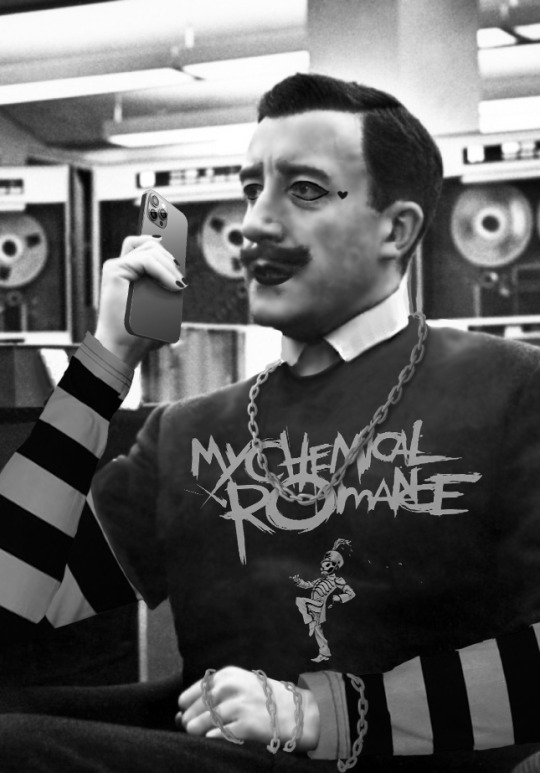
E-boy Group Captain Lionel Mandrake
#dr strangelove#lionel mandrake#group captain lionel mandrake#captain mandrake#eboy#e boy#e boy edit#eboy edit#photoshop#art#my art
20 notes
·
View notes
Text
As a somewhat random side note: I think I figured out why when I first thought about names for the Captain, my brain instantly went ‘Lionel, obvs,’ with utterly no reason and has since refused to accept any alternative. I watched Stanley Kubrick’s Dr. Strangelove a couple of weeks before I started watching Ghosts and never consciously related the two, but my dad wanted to watch it again tonight, so we did, and I was like, ‘hmmm, RAF Group Captain Mandrake (as played by Peter Sellers) reminds me a good bit of the Captain.’ And his first name, as it turns out, once it’s mentioned? Is Lionel. I enjoy it when I can work out just what the heck my subconscious is doing and why. It doesn’t happen very often, but it did tonight.
33 notes
·
View notes
Photo

25 notes
·
View notes
Text
Dr. Strangelove (1/8) Movie CLIP - Ripper's Motivations (1964) HD
Dr. Strangelove (1/8) Movie CLIP – Ripper’s Motivations (1964) HD
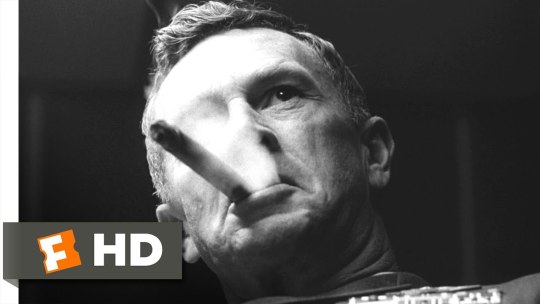

Source: YouTube
Here is a YouTube video by the YouTube channel Movieclips called Dr. Strangelove (1/8) Movie CLIP – Ripper’s Motivations (1964) HD of one of my favorite scenes from the 1964 movie Dr. Strangelove Or: How I Learned To Stop Worrying And Love The Bomb:
I like some of the angles that this was filmed at, the…
View On WordPress
#Brigadier General Jack D. Ripper#Cold War#Communism#Conspiracy Theory#Dr. Strangelove#Dr. Strangelove Or: How I Learned To Stop Worrying And Love The Bomb#Group Captain Lionel Mandrake#Jack D. Ripper#Movieclips#Officer (Armed Forces)#Postaday#Scene (Filmmaking)#Video#YouTube
0 notes
